- Clone
- BMA-12 (See other available formats)
- Regulatory Status
- RUO
- Other Names
- Neuroimmune semaphorin 4D, Sema4D, M-Sema G, Semaphorin-C-like 2, Semaphorin-J, Semaj, Semcl2, Coll-4, Semacl2
- Isotype
- Rat IgG2a, κ
- Ave. Rating
- Submit a Review
- Product Citations
- publications
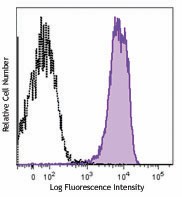
-

C57BL/6 mouse splenocytes were stained with purified CD100/SEMA4D (clone BMA-12, filled histogram) or purified rat IgG2a, κ isotype control (open histogram), followed by anti-rat IgG PE. -

C57BL/6 mouse frozen kidney section was fixed with 4% paraformaldehyde (PFA) for ten minutes at room temperature and blocked with 5% FBS for 30 minutes at room temperature. Then the section was stained with 10 µg/mL of purified anti-mouse CD100 (clone BMA-12) and anti-mouse Podoplanin (clone 8.1.1) Alexa Fluor® 594 (green) overnight at 4°C, followed by 2.5 µg/mL of goat anti-rat IgG (clone Poly4054) Alexa Fluor® 647 (red) for two hours at room temperature. The image was captured with a 10X objective.
| Cat # | Size | Price | Save |
|---|---|---|---|
| 147601 | 25 µg | ¥22,220 | |
| 147602 | 100 µg | ¥68,420 |
CD100, also known as Semaphorin-4D (SEMA4D), is a 150 kD, type I transmembrane protein, with one sema domain and one C2-type Ig domain. It is found as a homodimer on the cell surface. CD100 is expressed in the brain, kidney, heart, the majority of hematopoietic cells, and some malignant cells. CD100 is a potent inducer of angiogenesis and inhibitor of bone formation, and plays a role in lymphocyte activation, antibody production, dendritic cell maturation, and axon guidance. Its ligands are CD72 and Plexin-B1. CD100 is cleaved from the membrane of activated T and B cells, producing a soluble form.
Product DetailsProduct Details
- Verified Reactivity
- Mouse
- Antibody Type
- Monoclonal
- Host Species
- Rat
- Immunogen
- Mouse CD100-Fc fusion protein
- Formulation
- Phosphate-buffered solution, pH 7.2, containing 0.09% sodium azide.
- Preparation
- The antibody was purified by affinity chromatography.
- Concentration
- 0.5 mg/ml
- Storage & Handling
- The antibody solution should be stored undiluted between 2°C and 8°C.
- Application
-
FC - Quality tested
IHC-F - Verified
IP, ELISA - Reported in the literature, not verified in house - Recommended Usage
-
Each lot of this antibody is quality control tested by immunofluorescent staining with flow cytometric analysis. For flow cytometric staining, the suggested use of this reagent is ≤ 0.5 µg per million cells in 100 µl volume. For immunohistochemical staining on frozen tissue sections, the suggested use of this reagent is 5.0 - 10 µg per ml. It is recommended that the reagent be titrated for optimal performance for each application.
- Application Notes
-
Additional reported applications for the relevant formats include: immunoprecipitation from cell lysates2, capture antibody function in a sandwich ELISA assay2, and immunohistochemical staining of frozen brain sections4.
-
Application References
(PubMed link indicates BioLegend citation) -
- Kumanogoh A, et al. 2000. Immunity. 13:621. (FC)
- Wang X, et al. 2001. Blood. 97:3498. (FC, IP, ELISA)
- Kumanogoh A, et al. 2002. J. Immunol. 169:1175. (FC)
- Moreau-Fauvarque C, et al. 2003 J. Neurosci. 23:9229. (IHC)
- RRID
-
AB_2563413 (BioLegend Cat. No. 147601)
AB_2563413 (BioLegend Cat. No. 147602)
Antigen Details
- Structure
- Type I transmembrane protein, one sema domain, one C2-type immunoglobulin domain, homodimer, 150 kD.
- Distribution
-
Highly expressed on most hematopoietic cells, is also found in the brain, kidney, and heart. Overexpressed by some malignant cell types.
- Function
- Potent inducer of angiogenesis, inhibitor of bone formation, plays a role in lymphocyte activation, antibody production and dendritic cell maturation. In neurons, regulates dendrite branching and axon guidance.
- Ligand/Receptor
- CD72, Plexin-B1.
- Cell Type
- B cells, Dendritic cells, Neutrophils, Tregs
- Biology Area
- Angiogenesis, Cell Biology, Cell Motility/Cytoskeleton/Structure, Immunology, Neuroscience, Signal Transduction, Synaptic Biology
- Molecular Family
- Adhesion Molecules, CD Molecules
- Antigen References
-
1. Barclay A, et al. 1997. The Leukocyte Antigen FactsBook Academic Press.
2. Trowbridge IS, et al. 1993. Annu. Rev. Immunol. 12:85.
3. Kishihara K, et al. 1993. Cell. 74:143.
4. Pulido R, et al. 1988. J. Immunol. 140:3851. - Gene ID
- 20354 View all products for this Gene ID
- UniProt
- View information about CD100 on UniProt.org
Other Formats
View All CD100 Reagents Request Custom Conjugation| Description | Clone | Applications |
|---|---|---|
| Purified anti-mouse CD100 (SEMA4D) | BMA-12 | FC,IHC-F,IP,ELISA |
| PE anti-mouse CD100 (SEMA4D) | BMA-12 | FC |
| APC anti-mouse CD100 (SEMA4D) | BMA-12 | FC |
Compare Data Across All Formats
This data display is provided for general comparisons between formats.
Your actual data may vary due to variations in samples, target cells, instruments and their settings, staining conditions, and other factors.
If you need assistance with selecting the best format contact our expert technical support team.
-
Purified anti-mouse CD100 (SEMA4D)
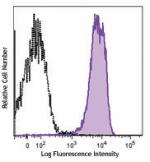
C57BL/6 mouse splenocytes were stained with purified CD100/S... 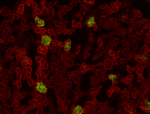
C57BL/6 mouse frozen kidney section was fixed with 4% parafo... -
PE anti-mouse CD100 (SEMA4D)
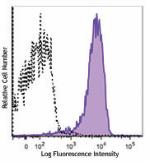
C57BL/6 mouse splenocytes were stained with CD100/SEMA4D (cl... -
APC anti-mouse CD100 (SEMA4D)
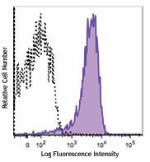
C57BL/6 mouse splenocytes were stained with CD100/SEMA4D (cl...








Follow Us